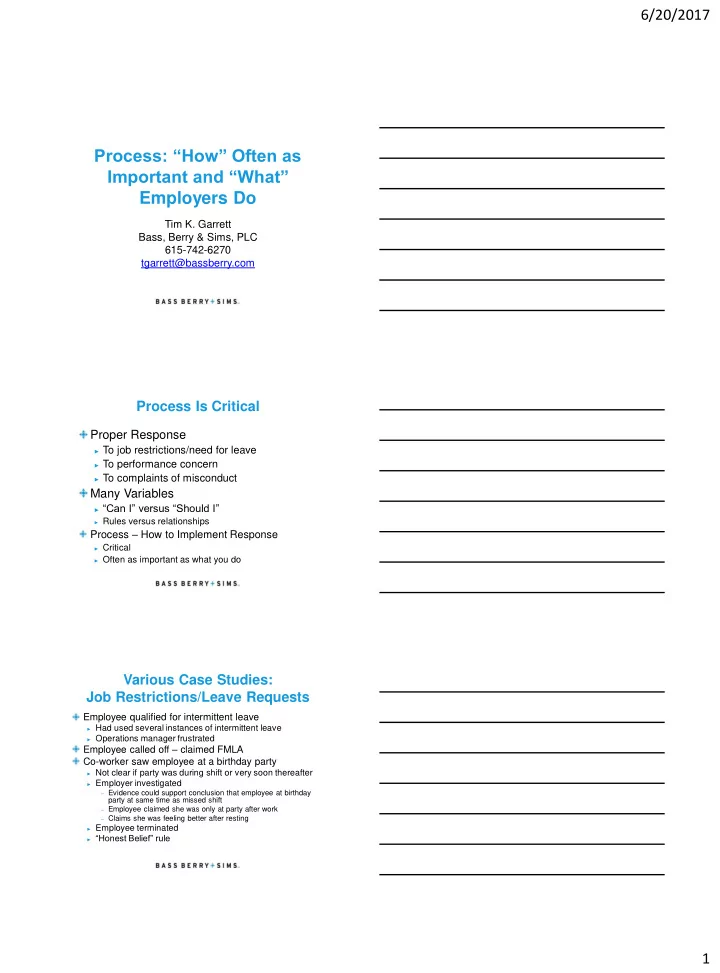

6/20/2017 Process: “How” Often as Important and “What” Employers Do Tim K. Garrett Bass, Berry & Sims, PLC 615-742-6270 tgarrett@bassberry.com Process Is Critical Proper Response ► To job restrictions/need for leave ► To performance concern ► To complaints of misconduct Many Variables ► “Can I” versus “Should I” ► Rules versus relationships Process – How to Implement Response ► Critical ► Often as important as what you do Various Case Studies: Job Restrictions/Leave Requests Employee qualified for intermittent leave ► Had used several instances of intermittent leave ► Operations manager frustrated Employee called off – claimed FMLA Co-worker saw employee at a birthday party ► Not clear if party was during shift or very soon thereafter ► Employer investigated – Evidence could support conclusion that employee at birthday party at same time as missed shift – Employee claimed she was only at party after work – Claims she was feeling better after resting ► Employee terminated ► “Honest Belief” rule 1
6/20/2017 Case Studies: Intermittent Leave (cont’d) Company did investigation ► Investigative report suggested follow-up to determine if employee being honest – not done Allowed Employee to explain ► But, prepared termination paperwork before met with employee Emails showing employer’s cynicism about past use of FMLA leave Employer denied summary judgment ( Gurne v. Michigan Bell) ► Shows animus ► “Cynicism is not attractive” ► Do not allow emails to “float” unanswered and/or corrected ► “Cat’s paw” theory – May need follow-up to eliminate tainted decision-makers Case Studies: Intermittent Leave (cont’d) Employee certified every 6 months for arthritis for period of years ► Requests and receives several periods of intermittent leave ► Months later, employer learns that employee was jailed for drunk driving ► Employer checks records and days in jail coincide with days took FMLA leave Result? Capps v. Mondelez Global, LLC Case Studies: Returning From Extended Leave FMLA continuous leave exhausted as of May 31 ► Can you terminate on June 1? ► What is duty? Process ► Is employee still “certified” as unable to return? To any job? ► ADA interactive process ► Note: Recent Case law on “re - assignment competition” ADA Reasonable Accommodation ► Includes extended leave ► How long? No guidance, but know indefinite not req’d ► Job protected? Yes, unless undue hardship 2
6/20/2017 Case Studies: Extended Leave ( cont’d ) Letter at end of FMLA leave giving options ► Return or provide information supporting additional leave need ► Interactive discussion ► Set date for review (what is reasonable in light of certification) ► No automatic consequences – if remain unable to return, will discuss at that time employee’s condition and company’s operational needs Distinction between job-protected leave and “holding job” Case Studies: Performance Concerns Performance Meeting Employee raises disability as basis for poor performance Required to forgive poor performance? Required to excuse work-rule violation? Case Studies: Performance Concerns (cont’d) Generally no Call center worker – terminated for too many dropped customer calls Employee claimed that the alleged misconduct was really poor performance and was caused by her diabetic condition EEOC filed brief in support of employee 3
6/20/2017 Case Studies: Performance Concerns Employer prevailed ADA accommodation are “always prospective” ► Not required to excuse past workplace misconduct or relax performance standards ► Employee’s retroactive accommodation request does not stay disciplinary process ► Note: Employer was already providing some accommodations (food, drink breaks as needed) ► But might have issues in Wisconsin – Wisconsin Bell, Inc. v. Labor and Industry Review Comm’n Case Studies: Reports of Misconduct FaceBook post ► Calling Manager “Nasty M***ER F***ER**” (among other expletives) ► Was in context of union campaign ► Ended with “Vote Yes” urgings Company investigated – terminated employee NLRB found Employer violated NLRA ► Conduct was “protected” ► Company (Pier Sixty) filed exceptions ► Result? Case Studies: Misconduct (cont’d) Second Circuit affirmed NLRB ► Were vulgar attacks but in context of union campaign and in midst of workplace concerns ► Company tolerated widespread profanity among workforce ► Online communication not in immediate presence of coworkers or patrons ► Not face-to-face in workplace ► But see Harbor Rail Services, Inc. recently decided – expletives lost protected status – not in midst of union campaign or over workplace mistreatment – employer did not tolerate profanity directed at others 4
6/20/2017 Best Practices: Identifying Witnesses and Documents Ask both complainant and alleged wrongdoer whom they wish for you to interview Schedule time and plan questions to protect integrity of process and protect both complainant and the alleged wrongdoer Best Practices: Identifying Witnesses and Documents (cont’d) Review personnel files, payroll records, discipline records, etc. Electronic information Special rules with social media Best Practices: Take Immediate Steps to Halt Wrongdoing If allegations involve dangerous or threatening behavior, consider moving to another area or suspension Not sure if pay or without pay until end of investigation ► But should consider with pay initially ► Set relatively short time period and at end of that time will re-evaluate 5
6/20/2017 Best Practices: Prepare the Investigation File and Log Especially for extensive investigations, should prepare report Include in Report ► Scope of work ► What was reviewed/done in investigation ► Findings ► Recommendations Best Practices: Common Mistakes to Avoid Failures of verification (phone records, emails, text messages) Failure to interview or re-interview certain witnesses Failure to recognize others may have engaged in same/similar misconduct who were not evaluated or disciplined Questions? 6
Recommend
More recommend